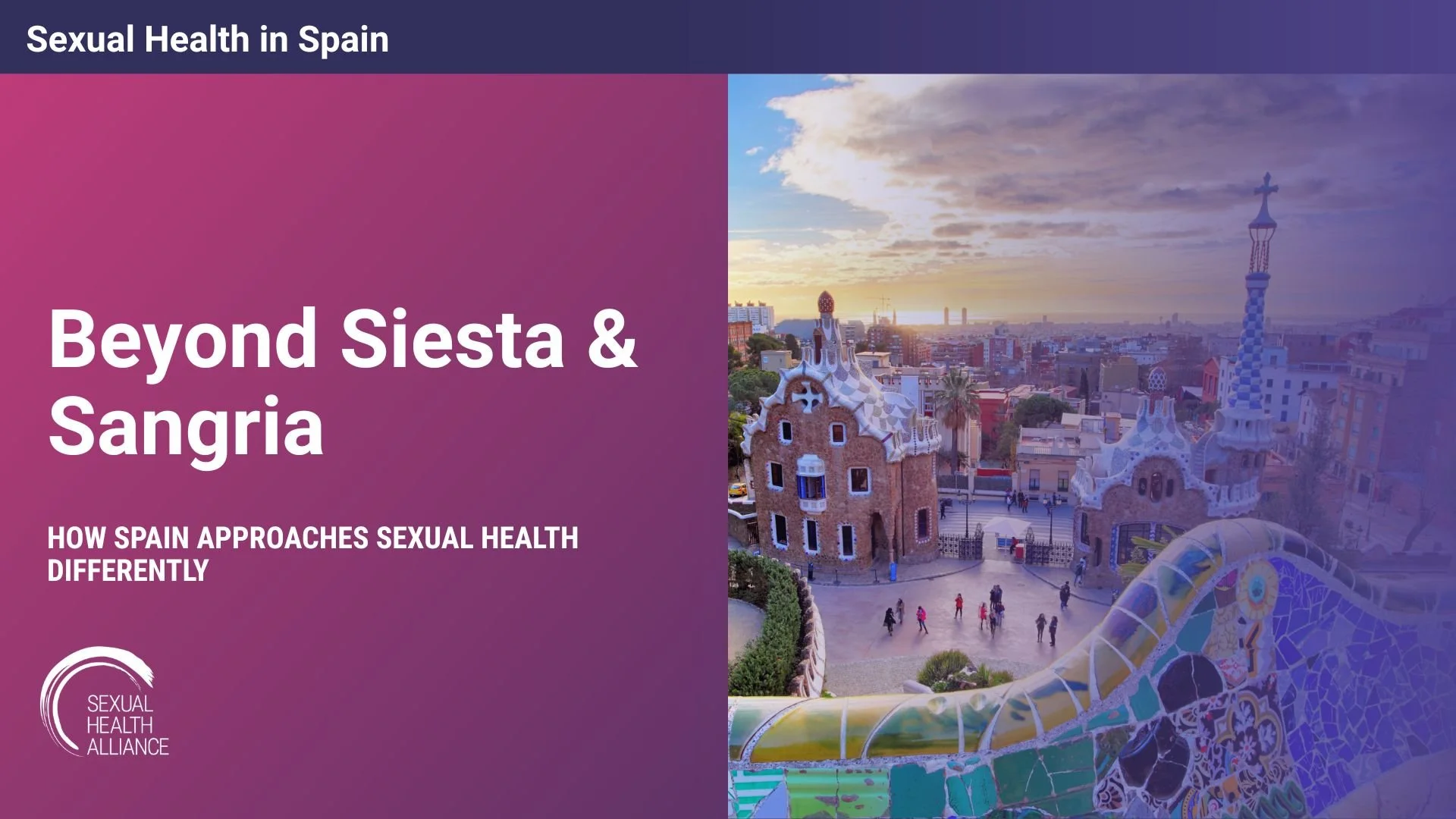A Lesson Beyond the Classroom: Sexual Health in Spain
From tapas to sexual health takeaways – SHA’s recent study abroad trip to Spain had it all!
With its vibrant culture, rich history, and open-minded spirit, Barcelona proved to be the perfect place to explore what it truly means to take a progressive, inclusive approach to sexual health and education.
SHA community members learned about everything from the origins of pornographic cinema in Spain to local perspectives on LGBTQI+ rights, gender equality, and ethical pornography. Between food tours, museum visits, and sunset cruises along the Mediterranean, the trip blended cultural immersion with meaningful learning, showing how sexual health can be woven into daily life and policy.
If you missed the highlights, here’s a closer look at what SHA’s travelers discovered from European sexuality experts, and how Spain continues to stand out as a global leader in progressive sexual health policy.
Progressive Policies and a Commitment to Equality
Catalonia, home to lively Barcelona, is leading the way in Spain’s sexual health infrastructure and inclusive policymaking. The region’s Ministry of Equality and Feminisms reflects Spain’s broader push for feminist, intersectional, and globally minded governance.
Through this department, Spain launched the National Strategy for Sexual and Reproductive Rights, a comprehensive framework that promotes bodily autonomy, informed consent, and health equity. This strategy positions sexual health not merely as a medical issue but as a fundamental human right tied to dignity, equality, and justice.
Spain also made history as the first predominantly Catholic nation to legalize same-sex marriage in 2005 – a full decade before the United States. This landmark reform demonstrated the country’s commitment to separating sexual rights from religious constraints, inspiring other nations to advance LGBTQ+ equality worldwide.
Sexuality Education from Preschool to Adulthood
Catalonia has enshrined sexuality education as a key component of personal development, gender equality, and the prevention of sexist and LGBT-phobic violence–anchored by five regional laws affirming this right.
Since 2022, comprehensive sexuality education (CSE) has been mandatory in schools beginning in preschool, with age-appropriate curricula through every education level. Counseling services have also been expanded to support students’ mental and sexual well-being.
In 2021, the Catalan government took another bold step by ending subsidies for single-sex schools, stating that “segregation gives way to stereotypes and legitimates sexism.”
Education doesn’t stop at adolescence. Catalonia has introduced comprehensive training programs for healthcare professionals to strengthen LGBTQI+ health knowledge. Non-pathologizing units have also been expanded to improve transgender healthcare, offering hormonal treatments, surgeries, and psychological support over the past five years.
Reproductive Rights and Abortion Access - Sexual Health in Spain
Spain guarantees the right to safe and legal abortion, and Catalonia plays a central role. Catalonia accounts for nearly 40% of all abortion centers nationwide.
In 2022, Spain updated its abortion care protocol to align with WHO recommendations, extending medical abortion from 9 to 14 weeks of gestation. The update also added access to free long-term contraception, psychological counselling, and screening for gender-based violence, reinforcing a holistic approach to care.
Access to contraception has also expanded. For individuals under 30 with gestational capacity, the government now provides free copper IUDs and subdermal implants for those with low income or who have survived gender-based violence—with the goal of making them universally free by 2026.
Menstrual Health and Workplace Well-Being
Spain is also breaking ground in menstrual equity. Since 2024, the government has distributed over half a million free menstrual products and introduced menstrual health education in high schools.
Catalonia’s civil servants have also benefited from a progressive workplace flexibility policy, allowing up to eight hours of recoverable time each month to manage menstrual or menopausal health needs. This initiative helps normalize workplace conversations about reproductive health and combats ageism, a step toward a more compassionate and inclusive work culture.
Ethical pornography
Spain is also home to a growing ethical pornography movement, led by creators like Erika Lust and Paulita Pappell. These filmmakers have reimagined adult cinema by prioritizing consent, diversity, authentic pleasure, and fair labor practices.
Erika Lust, founder of The Porn Conversation, created the nonprofit to equip parents and educators with tools to discuss porn literacy, helping young people navigate online sexual content critically and ethically.
The rise of ethical porn in Spain aligns with broader social movements advocating for gender equality, sexual rights, and education reform. Through open discussion and creative expression, Spain is leading a cultural shift toward healthy, shame-free sexual discourse.
Sexual Health in Spain: Sex work
Spain is one of the largest capitals for sex work in the world. When it comes to sex work, Spain’s approach remains complex. The country decriminalized sex work in 1995, and while laws restrict solicitation near schools or public transport, full regulation remains debated.
Barcelona has been at the forefront—following a 2015 ruling recognizing sex workers’ employment rights, including access to health insurance and social security. However, enforcement has been uneven, and national conversations continue.
Prime Minister Pedro Sánchez has called for the criminalization of sex work, citing police reports that four in five sex workers are victims of trafficking or coercion. The debate reflects broader tensions between labor rights, feminist perspectives, and anti-trafficking efforts.
Looking Ahead: Lessons from Spain
Barcelona stands out not only as a vibrant, inclusive city but as a living classroom for sexual health innovation and equity. Spain’s commitment to comprehensive education, reproductive justice, and gender equality offers a global model for integrating health and human rights.
As SHA’s study abroad participants reflected, the trip underscored an important truth: sexual health flourishes where openness, empathy, and equality are valued.
Spain’s approach invites a vital question for all of us: How can we apply these principles globally to strengthen sexual health, education, and justice?
Interested in joining a future SHA Study Abroad Program?
Interested in experiencing this kind of learning firsthand? SHA’s Study Abroad Programs combine travel, cultural exploration, and professional development – offering students and professionals the chance to see how different cultures approach sexual health.
Next up: SHA’s first-ever trip to Paris and Amsterdam– a program so popular it’s been brought back five times! Each trip includes exclusive sessions with global sexuality experts, cultural excursions, and plenty of opportunities to build lifelong friendships.
Spots fill quickly, so be sure to check the Study Abroad page for upcoming trips– and take your learning beyond the classroom.
Written by Emma Sell-Goodhand, MPH
Emma is a doctoral student and Global One Health Fellow at North Carolina State University studying adolescent sexual health. She brings prior experience as a Technical Advisor at the World Health Organization.
Want to become an in-demand sexual health professional? Learn more about becoming certified with SHA!







